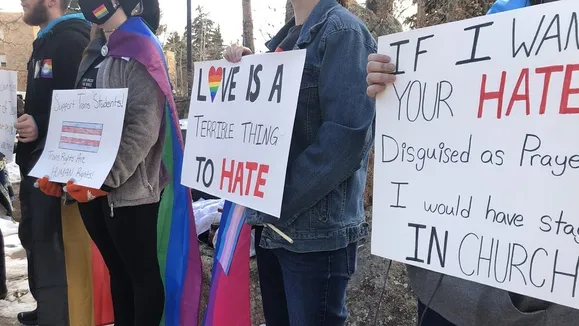
In the heart of a bustling university campus, a singular event unfolded that would ripple through the fabric of academic freedom and the ongoing discourse around LGBT rights. Shaun Christie, a student at the University of NorthWest (UNW), found himself at the epicenter of controversy for taking a stand against what he perceived as mandatory LGBT indoctrination during first-year orientation sessions. This incident not only sparked a walkout by a majority of students but also led to Christie’s suspension, igniting a fervent debate on the limits of educational content and the rights of students to voice dissent.
A Stand Against Conformity
At UNW, a session designed to introduce first-year students to LGBT issues became the battleground for a deeper conflict over educational mandates and ideological influence. Christie’s protest, grounded in the belief that the session amounted to indoctrination, resonated with many of his peers, leading to a significant walkout. This act of defiance brought to light the tension between promoting diversity and inclusivity and respecting individual beliefs and freedoms. The university’s decision to suspend Christie was met with immediate backlash, highlighting the growing concern over academic institutions’ role in shaping, rather than merely presenting, social and political ideologies.
Community and Ideological Battle Lines
The ChristianView Network swiftly came to Christie’s defense, asserting that his suspension was an infringement on the human rights of students to express dissenting views, especially against what they deemed irrelevant and non-academic sessions. The network’s call for UNW to lift Christie’s suspension, which the university eventually did, underscores the complex interplay of freedom of speech, educational content, and the role of higher education institutions in fostering an environment of open dialogue and diverse viewpoints. Critics argue that the privileging of ‘woke’ ideology, treated akin to a state religion by some academic bodies, raises questions about the objectivity and inclusivity of university policies and practices.
The Path Forward
In the aftermath of the controversy, UNW announced an investigation into the matter, signaling a potential reconsideration of how diversity and inclusivity initiatives are implemented on campus. The ChristianView Network’s demand for an end to what they describe as LGBT indoctrination and for equal time to be given to Christian views encapsulates the broader debate on educational freedom, ideological imposition, and the rights of students to engage with, question, and challenge the curriculum and extracurricular activities offered by educational institutions. This incident at UNW serves as a microcosm of the larger discussions taking place in society about the balance between promoting understanding of LGBT issues and ensuring that educational efforts do not cross into the realm of indoctrination.
In conclusion, the events at the University of NorthWest highlight a pivotal moment in the ongoing dialogue about the intersection of education, rights, and ideology. As universities continue to navigate the complex terrain of diversity, inclusivity, and freedom of speech, the story of Shaun Christie and the ensuing fallout serves as a reminder of the delicate balance that must be struck between educating students and respecting their diverse perspectives and beliefs. The resolution of this incident may set precedents for how academic institutions address similar challenges in the future, making it a significant marker in the broader discourse around education, rights, and societal values.



